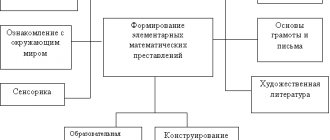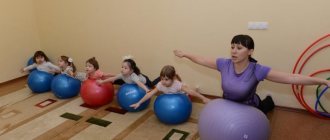The essence of the approach
The system-activity approach as the basis of the Federal State Educational Standard for preschool education has the following essence:
- development and education of personal qualities that fully meet the needs of the information environment, modern economy, based on tolerance and respect for representatives of other nationalities;
- the system-activity approach, the basis of the Federal State Educational Standard of Preschool Education, is considered as a transition in the educational environment to a strategy of social construction and design based on the content and methods of education, ensuring individuality, cognitive activity and personal development of students;
- focus on learning outcomes (the student’s personality is formed on the basis of his assimilation of universal learning actions in the process of learning about the world around him);
- a decisive role is given to methods of organizing activities, as well as options for achieving social, personal, cognitive improvement of students.
History of formation
The idea of combining activity and systems approaches was proposed by domestic scientists and teachers. The system-activity approach as the methodological basis of the Federal State Educational Standard appeared in 1985. Among its developers, we highlight E.V. Ilyenkov, E.G. Yudin, and psychologist A.G. Asmolov. The developers of the new educational system carefully studied the experience of foreign colleagues, as well as the methods of developmental and advanced learning created by L. S. Vygotsky, L. V. Zankov, D. B. Elkonin.
The system-activity approach as the methodological basis of the Federal State Educational Standard was the result of a synthesis of various innovative technologies created in the 20th century by foreign and domestic psychologists and scientists. He included the best teaching experience of several decades. Today, the system-activity approach is the basis of domestic education at all levels, including the preschool system.
The educational process in preschool educational institutions is regulated by state standards developed for the preschool educational program.
Specifics of the approach
The system-activity approach to teaching is the basis of the Federal State Educational Standard for preschool education. At the end of the last century, in domestic education attention was paid only to the acquisition of knowledge. No one attached importance to the issue related to the search for effective ways to assimilate theory, the development of individuality, the formation of citizenship and patriotism in the younger generation.
Training was based on the verbal method and forms of transmitting ready-made information, impersonality and monotony, and passive teaching of children. The information that they were forced to memorize was useless, schoolchildren did not need it in everyday life, and did not contribute to social adaptation and success in the profession.
Forms and methods
The system-activity approach as the basis for the implementation of the Federal State Educational Standard makes it possible to take into account the age-related, physiological, and psychological characteristics of children. Particular importance in the new educational system is given to the search for forms of communication between mentor and student for full and productive joint activities.
New technologies ensure a smooth transition from preschool education to the school level.
The system-activity approach as the basis for the implementation of the Federal State Educational Standard is distinguished by various organizational forms and allows taking into account the individual abilities of each individual student. Teachers can work not only with gifted children, but also with children with health limitations.
New educational trajectories
The system-activity approach as the basis of the Federal State Educational Standard involves assessing the quality of education according to certain criteria:
- learning results are personal and socially significant;
- high-quality knowledge allows children to build individual educational trajectories for personal development;
- differentiation of training is allowed while maintaining the unity of theoretical material;
- increased motivation of schoolchildren to study is manifested;
- conditions are created for personal and general cultural improvement;
- the formation of competencies is carried out in different subject areas.
The system-activity approach as the basis of the Federal State Educational Standard has practical significance; it is relevant and in demand in modern society.
Personality development
As a result of joint fruitful activities, children get the opportunity to realize their creative potential.
The system-activity approach is the basis for the effective implementation of the second generation Federal State Educational Standard. This method differs from traditional educational technologies in its variety of forms and the possibility of active inclusion in search and research activities.
How else do innovative educational technologies differ? The system-activity approach is the basis of the Federal State Educational Standard of LLC, without it it is difficult to fulfill the requirements that society places on the level of modern education.
The basis for the success of each child, the formation of his skills and numerous competencies, should be a systematic change of methods and types of activities, which is fully ensured by innovative educational technologies.
The system-activity approach as the technological basis of the Federal State Educational Standard needs an updated methodological base. It involves the selection of a set of innovative approaches and techniques that allow the teacher to enhance the students’ own activities.
Relevance of the method
Peterson created the system-activity approach. As the basis of the Federal State Educational Standard, he proposed the organization and control of educational and educational activities of preschool children in the context of life. A prerequisite is to take into account life plans, interests, values, and the use of innovative techniques and techniques.
The new preschool education paradigm has an activity-based version. Its main goal is the development of the personality of a preschooler on the basis of mastering universal methods of developing skills and abilities that form the instrumental basis of educational learning.
The system-activity approach is the basis of the Federal State Educational Standard of NEO. Its distinctive feature is the allocation of special attention to the process of development of the personality of a preschooler, his acquisition of moral, spiritual, and social experience.
It is this approach that has recently become the leading scientific method of cognition and transformation of objects. This direction of the methodology of theoretical research and social practice, based on the consideration of various subjects and objects as integral systems, makes it possible to identify the variability of educational subject areas.
Federal state requirements of the new generation require the allocation of a certain number of hours for the regional component in all academic disciplines. For example, as part of environmental education, children get acquainted with the trees, plants, and animals of their region, and gain experience in a tolerant attitude towards living nature.
The essence of the technique is to consider independent components in interconnection, movement, constant development and improvement.
This activity-based approach is the basis of the Federal State Educational Standards LLC, which are currently introduced into Russian preschool education.
A differentiated approach to education makes it possible to identify systemic integrative properties, as well as qualitative characteristics necessary for the harmonious development of the younger generation in Russia.
The historical, functional, substantive aspects of an integrated approach require a combination of such principles of analysis as specificity, historicism, taking into account development and comprehensive connections.
The cultural-historical aspect is based on the theoretical provisions of the pedagogical concepts of Galperin, Leontiev, Vygotsky. They paid special attention to the basic psychological laws of the processes of education and training, the structure of the educational activities of preschoolers, with mandatory consideration of the main features of the individual age development of children.
The main type of thinking that is associated with the new educational concept involves empirical thinking. The child gets the opportunity to select his own content of education, to choose in large quantities those areas that are interesting to children.





